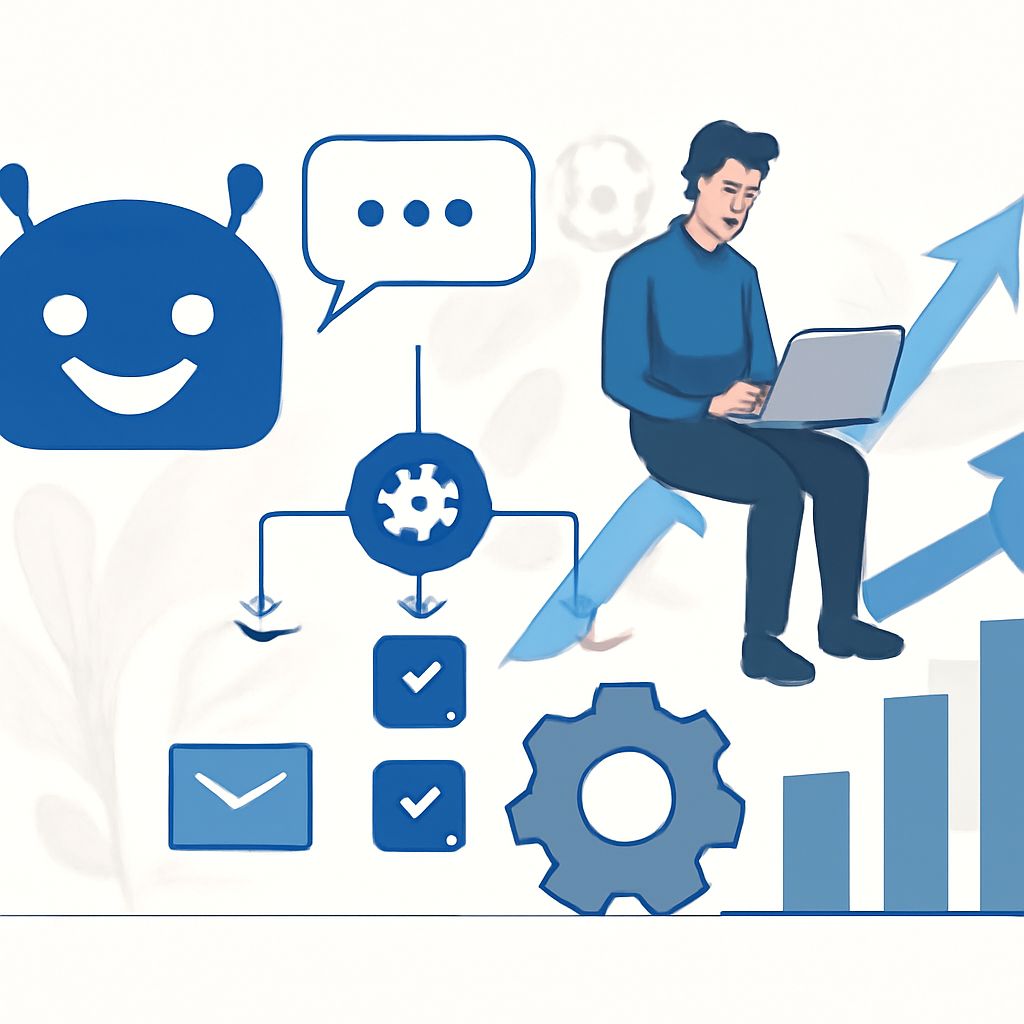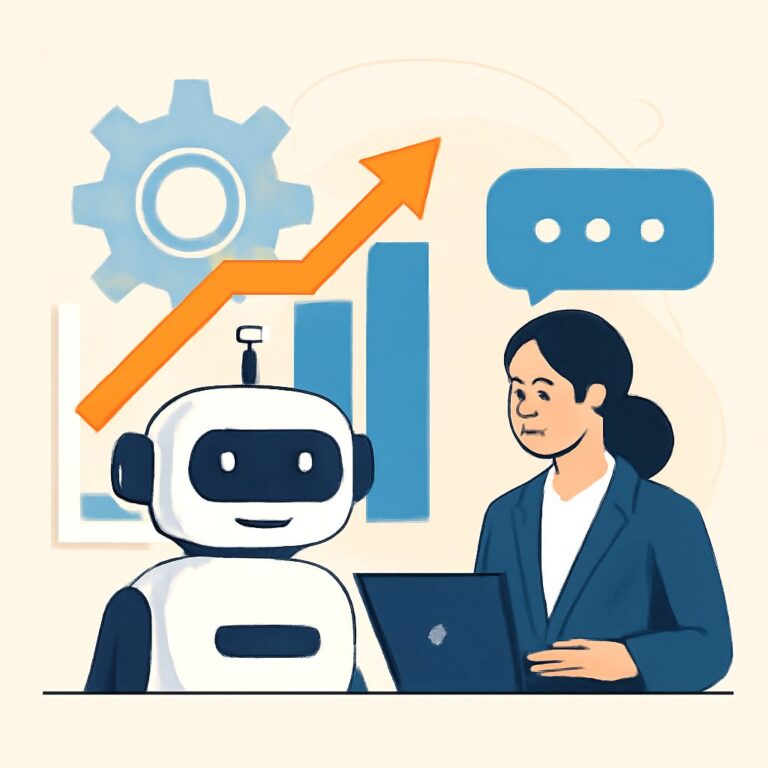Table of Contents
Introduction
In the rapidly evolving landscape of digital communication, businesses are constantly seeking innovative ways to enhance customer interaction and streamline operations. Chatbot automation has emerged as a powerful tool, offering potential not only for improving customer service but also for driving significant business growth. This article delves into the transformative impact of chatbots, exploring their benefits, implications, and strategies for effective implementation.
Understanding Chatbot Automation
What is a Chatbot?
A chatbot is a software application designed to simulate human-like conversation with users, typically through messaging applications, websites, or mobile apps. Leveraging natural language processing (NLP) and machine learning, chatbots can perform a variety of tasks ranging from answering simple queries to executing complex customer service functions.
Types of Chatbots
- Rule-Based Chatbots: Operate based on pre-defined rules and scripts. They are suitable for handling straightforward queries.
- AI-Powered Chatbots: Utilize artificial intelligence to understand context and deliver more sophisticated responses. Over time, they improve through learning from interactions.
The Business Benefits of Chatbot Automation
24/7 Availability
One of the standout advantages of chatbots is their capability to provide round-the-clock customer service. Unlike human agents, chatbots are not constrained by working hours, allowing businesses to engage with customers irrespective of time zones, thereby reducing waiting times and increasing customer satisfaction.
Cost Efficiency
Implementing chatbot automation can significantly reduce operational costs. By handling routine inquiries and transactions, chatbots free up human resources to focus on more complex tasks. This efficiency can lead to substantial savings, especially for businesses with high volumes of customer interactions.
Enhanced Customer Experience
With the ability to access vast amounts of data instantly, chatbots can offer personalized interactions by learning from previous engagements with users. This personalization improves the customer experience, encouraging brand loyalty and increasing sales conversion rates.
Data Collection and Insights
Chatbots are an excellent tool for collecting data on customer preferences and behaviors. By analyzing interaction logs, businesses can gain valuable insights into consumer needs, which can inform marketing strategies and product development.
Scalability
Chatbots are highly scalable, capable of handling thousands of interactions simultaneously. This scalability is vital for businesses experiencing rapid growth or seasonal spikes in customer inquiries.
Implementing Chatbot Automation: Best Practices
Define Clear Objectives
Before implementing a chatbot, businesses should clearly define their objectives. Whether it’s improving customer service, increasing sales, or collecting data, having a clear goal will guide the design and functionality of the chatbot.
Choose the Right Platform
Selecting the appropriate platform is crucial. Businesses should consider factors such as integration capabilities, scalability, and support for the necessary languages and regions.
Design Intuitive Interfaces
Usability is key to the success of chatbot interactions. Ensuring that the chatbot has an intuitive, user-friendly interface will facilitate smoother interactions and enhance user satisfaction.
Ensure Continuous Improvement
Regularly updating and refining the chatbot based on user feedback and technological advancements is essential. This continuous improvement ensures the chatbot remains effective and relevant.
Overcoming Challenges in Chatbot Automation
Handling Complex Queries
One of the challenges with chatbots is handling complex or unexpected queries. Businesses must ensure that their chatbots can escalate issues to human agents seamlessly when necessary.
Maintaining Data Privacy
With the increasing scrutiny on data privacy, businesses must prioritize the secure handling of customer data. Implementing strong encryption and data protection measures is essential in chatbot deployment.
Conclusion
Chatbot automation represents a significant frontier in digital business transformation, offering enhanced customer service, operational efficiency, and valuable insights for strategic growth. As businesses continue to explore this potential, those who strategically implement and continually evolve their chatbot solutions will likely gain a competitive edge, setting the stage for sustained growth in the digital era.
| Benefits | Challenges |
|---|---|
| 24/7 customer service | Handling complex queries |
| Cost reduction | Maintaining data privacy |
| Personalized customer interactions | Integration with existing systems |
| Scalability | Continuous improvement |
FAQ
What is chatbot automation?
Chatbot automation refers to the use of artificial intelligence-powered bots to handle customer interactions and provide solutions without human intervention, enhancing efficiency and customer service.
How can chatbot automation benefit my business?
Chatbot automation can streamline customer service, increase response times, reduce operational costs, and provide valuable data insights, leading to improved customer satisfaction and business growth.
Can chatbots improve customer engagement?
Yes, chatbots can significantly improve customer engagement by providing instant, personalized responses, 24/7 availability, and the ability to handle multiple queries simultaneously.
Are chatbots suitable for all types of businesses?
While chatbots can be beneficial for many industries, their suitability depends on the specific needs and customer interaction levels of a business. They are particularly effective in retail, finance, healthcare, and customer service sectors.
How do I implement chatbot automation in my business?
To implement chatbot automation, start by identifying key customer interaction points, choose a reliable chatbot platform, integrate it with existing systems, and continuously monitor and optimize its performance for best results.
What features should I look for in a chatbot platform?
Look for features such as natural language processing, easy integration with existing systems, scalability, analytics capabilities, and multi-channel support to ensure a comprehensive and effective chatbot solution.







